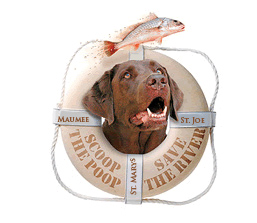 Does your pet leave things behind? When it rains, uncollected solid pet waste runs into streams and rivers as runoff. In addition to worms and protozoa, pet waste also contains fecal coliform baceteria. This group of bacteria includes the specific bacteria E. Coli which can cause cramps, diarrhea, serios intestinal and kidney illness, and even death to people who ingest contaminated water. There is a direct correlation between bacteria concentrations and gastrointestinal illness.
Does your pet leave things behind? When it rains, uncollected solid pet waste runs into streams and rivers as runoff. In addition to worms and protozoa, pet waste also contains fecal coliform baceteria. This group of bacteria includes the specific bacteria E. Coli which can cause cramps, diarrhea, serios intestinal and kidney illness, and even death to people who ingest contaminated water. There is a direct correlation between bacteria concentrations and gastrointestinal illness.
Fresh water is the source of many recreational and life-sustaining activities, including swimming, fishing, and of course, drinking! As a result, many communities across the country, including Fort Wayne, work hard to keep their water clean and useable. One of the most preventable and significant water pollutants is dog waste. Each gram of dog waste contains 23 million fecal coliform colonies. Unfortunately, many people do not pick up after their dog, and the uncollected waste eventually becomes part of our storm water runoff and flows into and pollutes creeks, streams, and our three rivers.
The Environmental Protection Agency (EPA) has deemed pet waste a “non-point source of pollution”, which puts solid pet waste in the same category as oil and toxic chemicals! Additionally, the decay of your pet’s waste actually creates nutrients for weeds and algae that grow in our waterways. As these organisms thrive on your dog’s droppings, they overtake the water and limit the amount of light that can penetrate the water’s surface. As a result, oxygen levels in the water decrease and fish can be asphyxiated.
If you aren’t worried about the state of our local waterways, you may be a bit more concerned about the impact of dog waste for your family and your budget. Sanitation laws are enforced and can bring hefty fines for each day the violation occurs. By persistently ![]() disposing of solid pet waste improperly (or not at all) you are kicking off a harmful cycle that can affect your whole family—including your pet.
disposing of solid pet waste improperly (or not at all) you are kicking off a harmful cycle that can affect your whole family—including your pet.
According to the U.S. Centers for Disease Control and Prevention (CDC), pet droppings can contribute to diseases animals pass to humans, called zoonoses. When infected dog poop is deposited on your lawn, the eggs of certain roundworms and other parasites can linger in your soil for years. Anyone who comes into contact with that soil—be it through gardening, playing sports, walking barefoot or any other means—runs the risk of coming into contact with those eggs; especially your dog.
Some of the hard-to-pronounce parasites your lawn could harbor include Cryptosporidium, Giardia, Salmonella, as well as hookworms, ringworms and tapeworms. Infections from these bugs often cause fever, muscle aches, headache, vomiting, and diarrhea in humans. Children are most susceptible, since they often play in the dirt and put things in their mouths or eyes.
Be considerate and responsible in all aspects of pet care. Never assume that solid pet waste eventually goes away just because it’s in an area far from water. Even left in wooded areas, uncollected waste ends up in our water through run-off.





